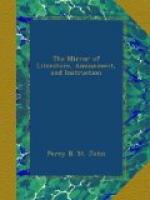Before the conquest of this country by the Normans, the land in Norfolk was so light and fine, that the farmers usually plowed with two rabbits and a case knife!—Jones’s Wonderful Changes, p. 86.—Weep at this ye who are now racking your inventive powers for improvements in agricultural implements. See what your forefathers could accomplish by means the simplest.—Risum teneatis?
* * * * *
There are many stories told of the craft of the fox to compass his prey, of which Ol. Magnus hath many: such as feigning the bark of a dog to catch prey near the houses; feigning himself dead to catch such animals as come to feed upon him; laying his tail upon a wasp’s nest and then rubbing it hard against a tree, thus catching the wasps so killed; ridding himself of fleas by gradually going into the water with a lock of wool in his mouth, and so driving the fleas up into it and then leaving it in the water; by catching crab fish with his tail, which he saith he himself was a witness of.—Derham’s Physico-Theology, book iv. chap. 11., and Ol. Mag. Hist. lib. xviii. cap. 39, 40.—Peruse this ye incredulous lectors of Baron Munch-Hausen, and Colonel Nimrod. Talk no more of the fertile genius of our Yankee brethren, but candidly admit ye are blameworthy for withholding credence to matters which rather border on the marvellous.
* * * * *
Had man been a dwarf he could not have been a rational creature; for he must then have had a jolt head, so there would not have been body and blood enough to supply his brain with spirits, or he must have had a small head answerable to his body, and so there would not have been brain enough for his business.—Grew’s Cosmol. Sacr. book i. chap. v.
Had the calf of the leg been providentially and prominently placed before, instead of being preposterously and prejudicially placed behind, it had been evidently better; forasmuch as the human shin-bone could not then have been so easily broken,—Dr. Moreton’s Beauty of the Human Structure, page 62.—What a pity it is that these two learned and self-sufficient authors, were not consulted in the formation of their own persons: doubtless they could have suggested many improvements, and would have felt all the advantages with due effect—probably they might have liked their heads to screw on and off like Saint Denis, of France, who frequently carried his under his arm.
* * * * *
The City of London is the largest city in the world, and the people of London the wisest—Wilson’s Candid Traveller, page 42.—Mark this, ye who are levelling your leaden wit at the worthy aldermen and cits of this “large” and “wise” metropolis.
* * * * *
At the famous battle of Crescy, gained by Edward III., notwithstanding a vast carnage of the French, and an infinite number of prisoners, the English lost only one ’squire, three knights, and a few of inferior rank.—History of England, by Goldsmith.




